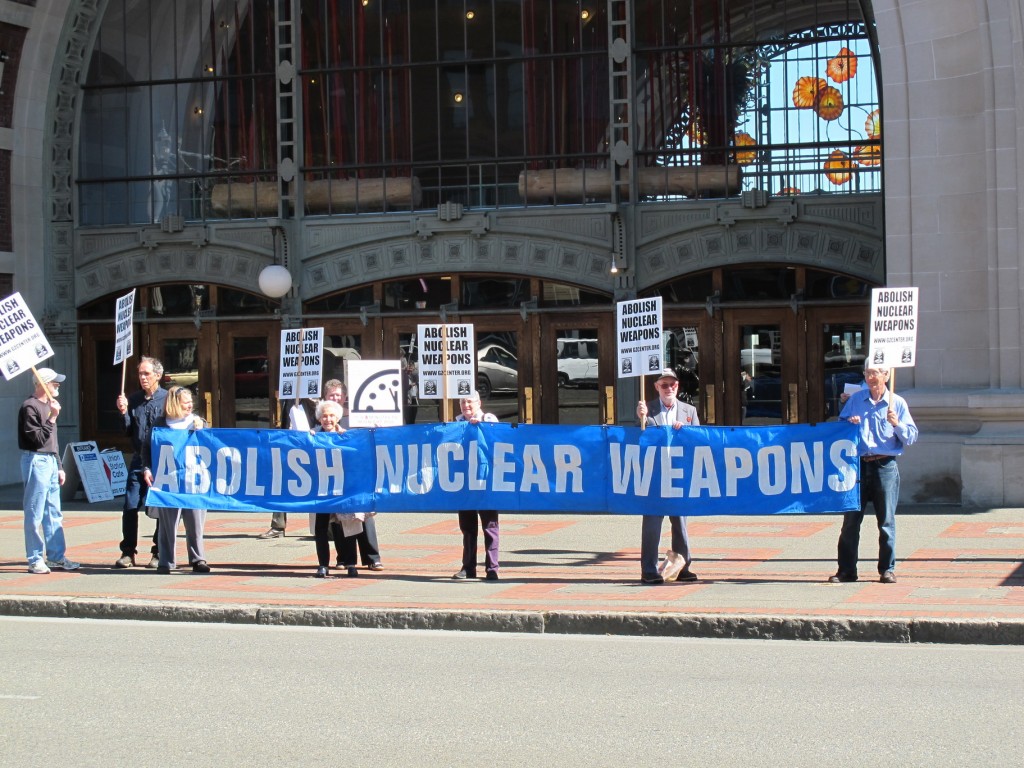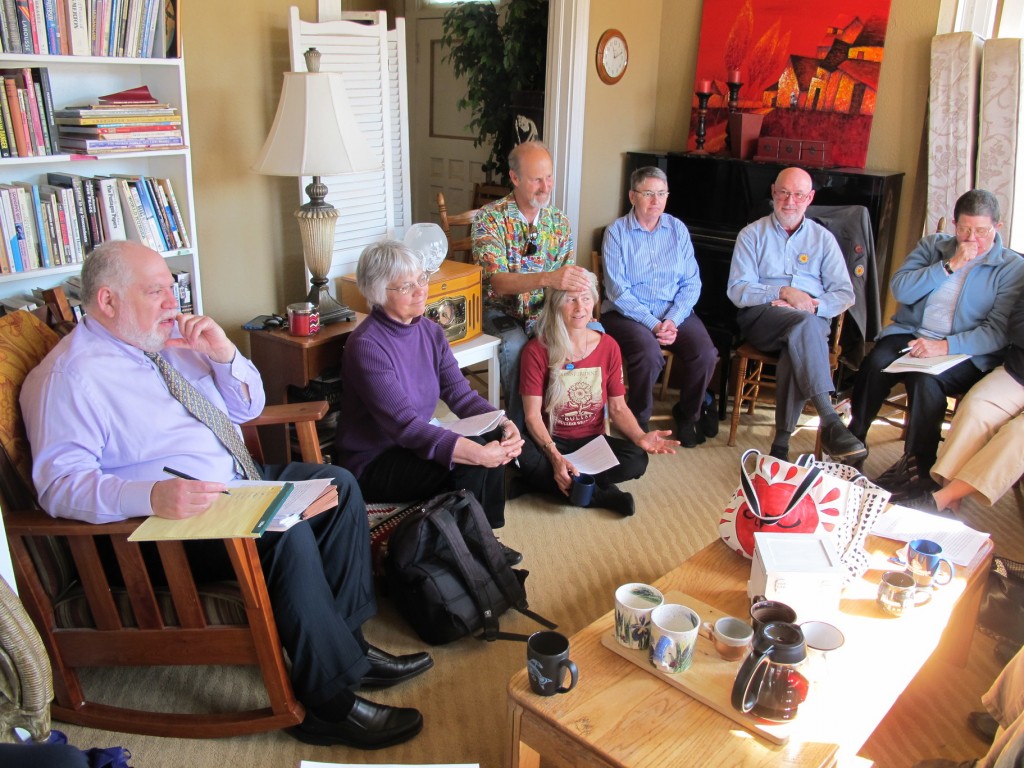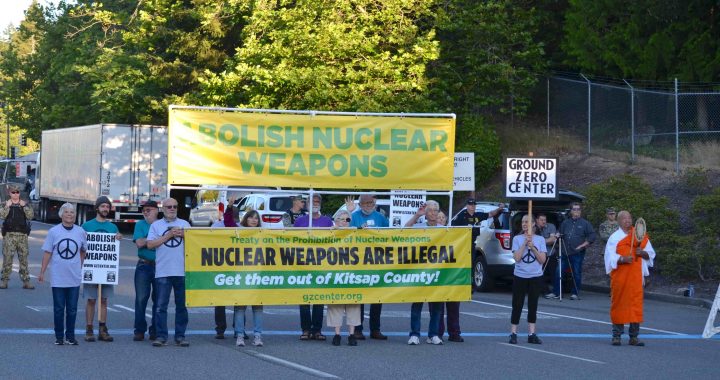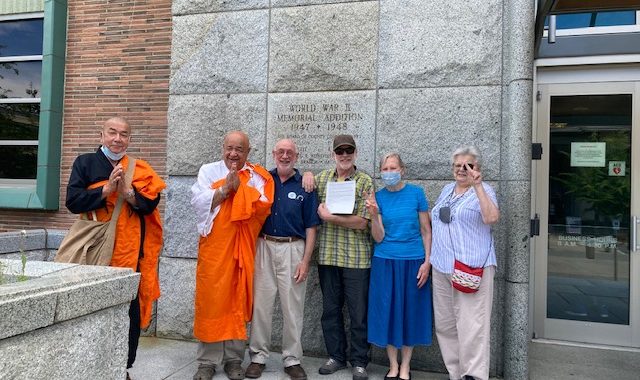Eight peace activists stood trial On Friday, April 1, 2016 in US District Court on charges of trespassing onto a US nuclear weapons base.
On August 10, 2015 the eight activists crossed the blue line onto Naval Base Kitsap-Bangor, which represents the largest operational concentration of nuclear weapons in the US arsenal, in an act of nonviolent civil resistance. Some staged a die-in, spreading ashes around others’ bodies on the asphalt, while two members of the group attempted to deliver a letter to the base commander (CLICK HERE to read the letter) urging him to uphold international law regarding nuclear weapons.
All were charged with trespassing onto a closed military installation and released on the same day; they were arraigned in November 2015.
The Trident submarine base at Bangor, just 20 miles from Seattle, contains the largest concentration of operational nuclear weapons in the US arsenal. Each of the 8 Trident submarines at Bangor carries up to 24 Trident II (D-5) missiles, each capable of being armed with as many as 8 independently targetable thermonuclear warheads. Each nuclear warhead has an explosive force of between 100 and 475 kilotons (up to 30 times the force of the Hiroshima bomb).
The eight defendants, who call themselves the Bangor Eight, are Mary Gleysteen, Kingston, WA; Anne Hall, Lopez Island, WA; Ann Kittredge, Quilcene, WA; Betsy Lamb, Bend, OR; Peggy Love, East Wenatchee, WA; Emilie Marlinghaus, Bend, OR; Elizabeth Murray, Poulsbo, WA; and Michael Siptroth, Belfair, WA.
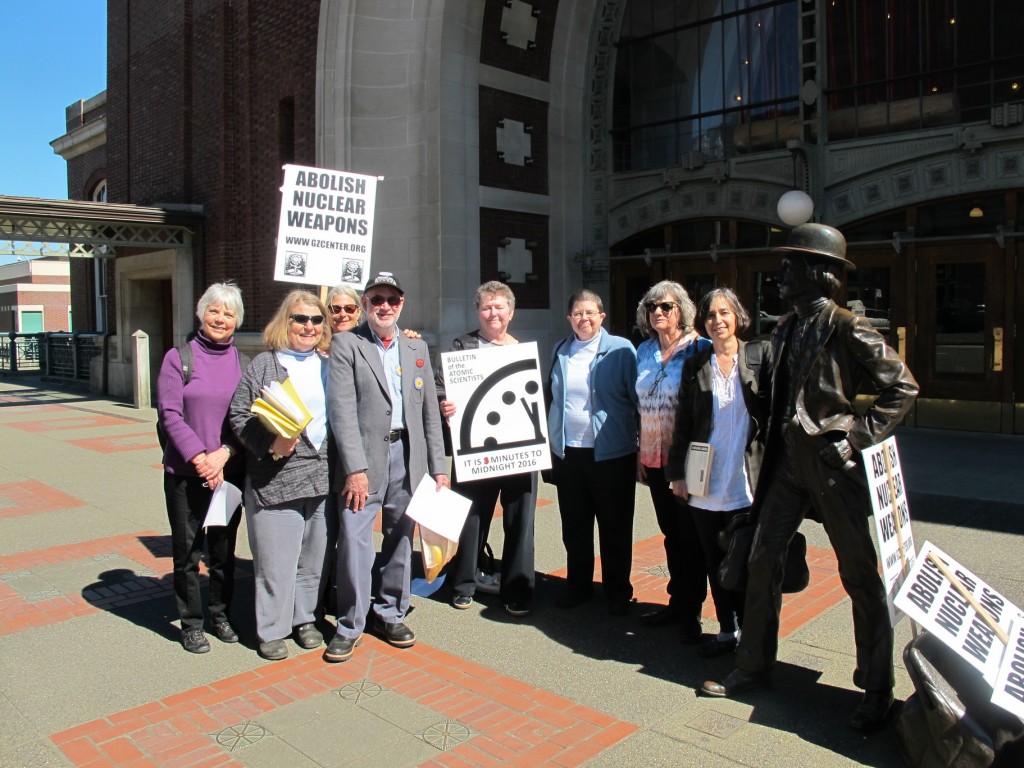
Bangor Eight defendants (L to R): Anne Hall, Mary Gleysteen, Ann Kittredge, Michael Siptroth, Emilie Marlinghaus, Betsy Lamb, Peggy Love, Elizabeth Murray
The Honorable David W. Christel, United States Magistrate Judge, presided over the April 1, 2016 trial in the U.S. District Court for the Western District of Washington in Tacoma. Attorney Ken Kagan, who has represented nuclear resisters for many years, assisted the defendants. Kagan represented five of the defendants, while Lamb, Murray and Siptroth acted in their own defense (pro se).
The eight separate cases were all heard together as the defendants requested and consented to a consolidated trial.
Judge Christel accepted the motion by the government to exclude a wide range of evidence that could be used in the defense including necessity defense, international law, in-force treaties, and policies of the US government regarding the use of nuclear weapons.
The prosecution opened, stating that there is a “thin blue line” [on the roadway entering the base] marking the boundary of Naval Base Kitsap-Bangor. All protest and other forms of speech are allowed outside of the blue line. The defendants crossed the line, were ordered to leave, and did not comply. Therefore the court should find them guilty.
Kagan opened for the defense by saying that, “each person has a very definite point of view as to why they were there” He further stated that he would, “let the testimony unfold as it will.” He then offered the August 10, 2016 letter, which the defendants attempted to deliver to Commander Zwolfer, to be entered into evidence.
The Judge examined the letter and stated that he found, “no foundation for this” [the letter], and would hold defendants’ exhibit 1 for decision later in the trial. The letter was ultimately entered into evidence.
Although severely hamstrung by the court’s decision to disallow the many reasonable defenses sought by the defendants, they nevertheless proceeded with their testimonies. The defendants spoke eloquently and passionately on their own behalf.
The defendants were then called, one at a time, to take the stand.
Betsy Lamb was the first to take the stand. She said that she was, “here today because it is so important for me to stand up and call our nation to lead the international effort to abolish nuclear weapons.” She started to read the text of the August 10th letter, to which the prosecution objected. After reviewing the letter Judge Christell admitted it as evidence and allowed Lamb to read portions of it into the record. Lamb said that, “we [as a nation] need to conform to what we expect of other nations” and that “we were calling on Capt. Zwolfer” to act in good conscience. “In my defense, I say only that as a person of faith and conscience, when I see something as wrong as our proliferation of nuclear weapons systems and their current and proposed use, I have to act.” Lamb concluded by asking the judge “to step outside the box that is contiguous with your comfort zone. Act in whatever way(s) you feel appropriate to address the menace of nuclear weapons. Perhaps – for one thing – here today, find our actions justified, as an initial step.” (CLICK HERE to read Betsy Lamb’s full trial statement).
Mary Gleysteen took the stand next, providing some background on her current activism. Among the stories she told was how, as a child in a military family in 1955 while living in Quantico, Virginia, her mother allowed her to drink from the “colored only” drinking fountain, telling her that if you see something that is wrong you need to say or do something to correct it. Her growth in activism went from signatures to action; from protesting weapons shipments from Bangor to Vietnam to protesting Bangor’s first-strike ballistic missile submarines. Gleysteen stressed how she has engaged in every form of “legal” protest over the years, including contacting members of congress and the executive branch, all to no avail. She has also spent decades leafleting at Bangor. She “knows what goes on at the Bangor base” and “felt compelled by the 70th anniversary of the atomic bombing off Nagasaki” to take action. She concluded by stating that her purpose on August 10th was “to express my opposition to nuclear weapons as immoral, irresponsible and unsafe.”
In speaking of her reasons for her action on August 10th, Ann Kittredge spoke emotionally of her sense of duty to her (and other people’s) children and grandchildren. Although her testimony was brief, it was strong and to the point.
Upon taking the stand, Emilie Marlinghaus gave the names and ages of her children and grandchildren to point out the reason she took action against nuclear weapons – her first ever – on August 10th. Following the death of her husband, and having raised her children, she came to the realization that those skills developed through her early life would serve her well in her new life of activism. This new life began with protests against the Iraq war. To help explain her passion for activism Marlinghaus quoted the Trappist monk Thomas Merton, who said, “I want my whole life to be a protest against war and political tyranny. No to everything that destroys life. Yes to everything that affirms it.”
Elizabeth Murray, who spent 27 years with the CIA, explained how her experience as a government bureaucrat made her understand that so often the “last thing on their [the government’s] mind is collateral damage” when making so many decisions involving the potential loss of lives through the use of “kinetic action.” Murray also quoted Robert Shetterly, the painter of “Americans Who Tell The Truth,” who said that “dissent is the prerequisite for democracy.” (CLICK HERE to read Elizabeth Murray’s full trial statement)
Michael Siptroth began his statement by quoting Black Lives Matter activist DeRay McKesson: “We’ve never said protests are the answer, but protests create space for the answer. Protest is disruption. Protest is confrontation. Protest is the end of silence, and what protest does is it creates space for other work to happen.” Siptroth said that he would not “be silent as my government prepares for war, developing weapons of mass destruction while depriving millions of people basic human dignity and peace,” and violating “domestic and international law.”
Peggy Love began by explaining that she was born on August 8, 1945, in between the bombings of Hiroshima and Nagasaki. That has become an important reminder for her over the years. August 2015 was not only the 70th anniversary of the atomic bombings, but her 70th birthday as well as her first birthday without her husband Jerry, who died of cancer and worked with Naval nuclear reactors during his career. Love could not acknowledge her 70 birthday without speaking out against the nuclear weapons at Bangor. “I did what I believe to be the act of a good citizen… exercised my first amendment rights.” (CLICK HERE to read Peggy Love’s full trial statement)
Anne Hall, an “ordained minister in the evangelical lutheran church” said she has lived “most of my life as a Christian… have tried to live as Jesus taught me to live.” Hall referred to the story of the Good Samaritan, saying that “we are called to love most of all the people we are taught to despise.” Hall said that she is “sure that Jesus would be appalled by nuclear weapons…” and that she is also “sure he would have stood in front of trains bringing nuclear weapons into a base… would have blocked roads and would have done everything he could” to abolish nuclear weapons. Hall also spoke of the history of leafleting people working at Bangor, and how at the height of leafleting efforts there were leaflets on bulletin boards all over the base, and that some people have left their jobs as a result of leafleting. She spoke of her vision of people at the base going on strike, and refusing to work on nuclear weapons. Hall stated how the nuclear danger now is as great or greater than it was during the Cold War; how the rest of the nuclear nations are modernizing in response to US modernization and Russia is angry about NATO expansion. On August 10th she “wanted to communicate to base workers, the public and ourselves that the only way to avert the increasing risk of nuclear war is to work with every ounce of our strength both domestically and globally to outlaw nuclear weapons and to put in place comprehensive safeguards so these weapons will be dismantled and abolished forever. (CLICK HERE to read Anne Hall’s full trial statement)
In his closing arguments, attorney Kagan argued that under the trespassing statute, in this case, the first amendment (attempting to convey a crucial political idea) justifies the defendants’ attempted entry, and therefore does not constitute trespassing under this statute as there was no obstruction or vandalism. The trespassing statute, 18 U.S. Code § 1382 – Entering military, naval, or Coast Guard property, can be enforced “if a person enters for a purpose prohibited by law.”
Judge Christell found that Kagan did not present adequate justification to support his argument and, based on the factual findings, found that each person had entered the base that is within the jurisdiction of the US without prior authorization and for a purpose prohibited by law or lawful regulation, constituting a violation of section 1382. Having found them guilty and in violation of section 1382 he moved to sentencing.
During sentencing the government called one witness, Christopher Crane, Operations Officer for Bangor Base Security. Crane explained that he and others from the base visited with members of the Ground Zero Center community (GZ) before the August 10th action and learned about the groups basic plans for the weekend. He further stated that he and his team had already made an action plan before the meeting with GZ. The action plan was designed “to cover all possible scenarios” and was approved by the “commanding officer of the base.” The total number of base personnel involved was about 25, “taking people away from their regular jobs.” Crane cited 70 to 75 hours of preparation to handle the protest.
Kagan, in response, said that 70 to 75 hours of preparation was “overkill” based on the history of Ground Zero’s nonviolent actions at the base. The organization has a flawless safety record, utilizing trained Peacekeepers who ensure everyone’s safety and act as liaisons to law enforcement personell.
Although the Government did not ask for confinement or fines, it did recommend one year of supervised probation and community service; 100 hours for Kittredge, Love, Marlinghaus and Murray; 150 hours for Gleysteen, Lamb and Siptroth; and 200 hours for Hall. The graduated community service hours were based on the defendants respective prior records of barment letters and convictions. In addition, the community service would have to be conducted with an “organization unrelated to nuclear disarmament.”
Kagan told the judge that these are “people with deeply held values who are deeply concerned” about our nation’s nuclear weapons policies and practices. He quoted a sign at the Whidbey Island Naval Air Station that said, “Pardon our noise; it’s the sound of freedom,” going on to say that, “well, what this group did is part of the cost of freedom.”
Siptroth spoke to what he called the narrowness of the prosecutions overly strict interpretation of the law. He told the court that the sentences handed out will not stop the defendants from repeating their actions in the future. “We will be back here again and again until you understand that you are trying to impose a very narrow legal interpretation.”
Judge Christell accepted the Government’s recommendation of one year probation, and did not impose the recommended graduated community service hours; he gave a flat 100 hours to all defendants. He agreed to the government’s recommendation that the service be conducted with an “organization unrelated to nuclear disarmament.”
After the trial Rev. Hall reflected on sentencing: “When Magistrate Chrystel said our community service couldn’t go to work for nuclear disarmament, I wanted to say, ‘Did you hear what we were saying? Does it occur to you that if we don’t avert nuclear war there won’t be any community to serve?’”
While the verdict was disappointing to the defendants and their supporters in the courtroom, all agreed that they had presented a worthy collective defense. In reality, however, it was not the defendants at this trial who should have had to defend their actions; it is our government, whose actions are, ironically, indefensible. A nation that continues to modernize its nuclear weapons systems and holds humanity under the constant threat of nuclear annihilation, while ignoring treaty obligations and international humanitarian law, is both morally bankrupt and guilty of the highest crimes against humanity.
President Obama, at the close of last week’s Nuclear Security Summit, extolled “the extensive and impressive national action steps that many of us have taken, and the collective efforts that we’ve made to reduce the amount of nuclear material that might be accessible to terrorists around the world.” Although it is important to keep nuclear materials out of the hands of terrorists, the risks posed by the nuclear nations’ continuing escalation of a new nuclear arms race are huge by comparison. It is of critical importance that the U.S. and Russia begin a serious dialogue, and begin to make progress, on nuclear disarmament to send a clear message to the much smaller nuclear powers and move the process forward toward global disarmament within a comprehensive, multilateral, strict, legal framework.
Before the trial, supporters of the Bangor Eight held a vigil protesting nuclear weapons in front of the Tacoma Union Station Courthouse; their message was clear and concise. They also held a commissioning of the eight defendants before everyone entered the courthouse for trial.Watch Full Movie Online Streaming Online and Download
Earlier in the day the defendants met with attorney Ken Kagan at Jean’s House of Prayer at the Tacoma Catholic Worker in preparation for trial. We are grateful to the Tacoma Catholic Worker community for their support and gracious hospitality.
The Bangor Eight also wish to extend a huge Thank You to Ken Kagan who provided his legal assistance completely pro bono (at no cost).
The U.S. Navy’s current planning for a new fleet of ballistic missile submarines, costing nearly $100 billion to build, is accelerating the rapidly developing submarine nuclear arms race. It has been estimated that by the time the new generation of ballistic missile submarines are put into service, they will represent 70 percent of the nation’s deployed nuclear warheads.
Ground Zero’s NO To NEW TRIDENT Campaign (notnt.org) is working to de-fund the Navy’s plans for the next generation ballistic missile submarine.
For nearly forty years Ground Zero Center for Nonviolent Action has engaged in education, training in nonviolence, community building, resistance against Trident and action toward a world without nuclear weapons.
###
Trial-Related Documents
CLICK HERE to read the 8/10/2016 letter to Captain Zwolfer.
CLICK HERE to read Anne Hall’s trial statement.
CLICK HERE to read Betsy Lamb’s trial statement.
CLICK HERE to read Peggy Love’s trial statement.
(CLICK HERE to read Elizabeth Murray’s full trial statement)
(CLICK HERE to read Michael Siptroth’s full trial statement)
NOTE: We will post additional statements as they become available.

